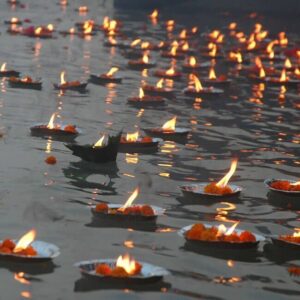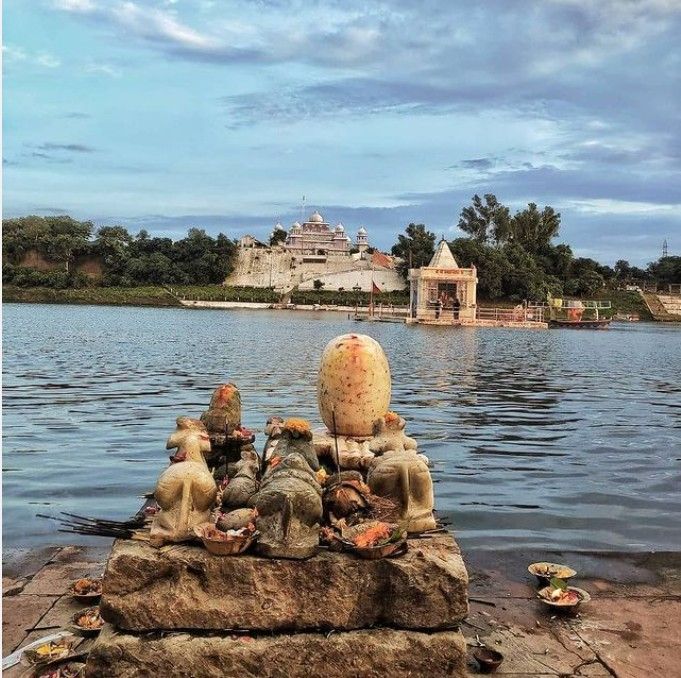India is a land of diverse cultures, traditions, and festivals that celebrate the divine aspects of nature. Among the many sacred occasions observed in the country, Narmada Jayanti holds special significance, especially for devotees of Maa Narmada, one of India’s holiest rivers. This festival marks the birth anniversary of the Narmada River, celebrated with great devotion and fervor in many parts of India, particularly in Madhya Pradesh, Gujarat, and Maharashtra.
Mythological Significance

The Narmada River, also known as Rewa, is one of the seven most sacred rivers of India. According to Hindu mythology, the river is believed to have originated from the tears of Lord Shiva, making it extremely divine and purifying. It is said that taking a dip in the Ganges can cleanse one’s sins, but merely seeing the Narmada River is enough to attain purification.
Another legend states that the Narmada River was created by Lord Shiva to cleanse the sins of humanity and to offer a sacred pilgrimage path. It is often associated with spiritual awakening and inner peace, attracting thousands of devotees who undertake the Narmada Parikrama, a sacred circumambulation of the river.
The Spiritual and Religious Importance
Narmada Jayanti is observed on the Shukla Paksha Saptami (seventh day of the waxing moon) in the Magha month of the Hindu calendar, usually falling in January or February. It is believed that worshiping Maa Narmada on this day bestows devotees with prosperity, peace, and liberation from sins. Many pilgrims and saints gather along the riverbanks to perform rituals, prayers, and aarti in reverence to the sacred river.
The river is also linked with Lord Shiva, who is considered the divine protector of the Narmada. Hence, Shiva temples located along the riverbanks witness grand celebrations and religious gatherings on this occasion.
Rituals and Celebrations
Narmada Jayanti is celebrated with immense devotion, especially in towns and cities located along the river, such as Amarkantak, Jabalpur, Omkareshwar, Hoshangabad, and Bharuch. The major rituals performed on this day include:
- Holy Bath (Snan): Devotees take a holy dip in the Narmada River, believing that it washes away sins and purifies the soul.
- Special Puja and Aarti: Grand Ganga Aarti-like ceremonies are held on the ghats, where devotees offer flowers, diyas, and prayers to the river.
- Chanting and Recitation: Religious texts such as the Narmada Purana and hymns dedicated to the river are recited, glorifying its sanctity.
- Offerings to the River: Devotees offer coconuts, fruits, sweets, and milk to the river as a mark of gratitude and reverence.
- Parikrama Yatra: Some pilgrims participate in the Narmada Parikrama, a 3,300-km circumambulation of the river, which is considered one of the toughest yet most spiritually rewarding pilgrimages in Hinduism.
Environmental Importance of the Narmada River
Beyond its religious significance, the Narmada River plays a crucial role in the ecology and economy of Central India. It is one of the longest west-flowing rivers in the country and serves as a vital water source for irrigation, drinking water, and hydroelectric projects. The river supports diverse flora and fauna, making it an essential part of India’s natural heritage.
However, pollution, deforestation, and excessive dam construction pose threats to the river’s health. On Narmada Jayanti, environmentalists and devotees take initiatives to clean the river, plant trees along its banks, and raise awareness about the need for its conservation.
The Spiritual Journey of Narmada Parikrama
One of the unique aspects of devotion to Maa Narmada is the Narmada Parikrama, a sacred journey undertaken by thousands of devotees who walk along the river’s course, covering both banks. Unlike pilgrimages to shrines or temples, the Parikrama is a continuous walk without crossing the river, emphasizing penance, faith, and surrender to divine will. Many saints and seekers believe that completing this Parikrama grants moksha (liberation) and fulfills all desires.
Conclusion
Narmada Jayanti is a festival that celebrates the sanctity, spirituality, and ecological importance of the Narmada River. It is a day of devotion, gratitude, and commitment to preserving the sacred waters. Whether viewed through the lens of mythology, religion, or environmental conservation, the significance of the Narmada River remains deeply embedded in the cultural and spiritual fabric of India. By honoring Maa Narmada, devotees not only seek divine blessings but also acknowledge the life-giving essence of nature, reminding humanity of its duty to protect and cherish sacred water bodies.

